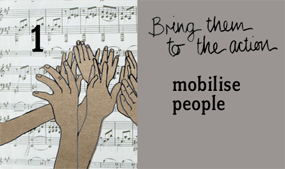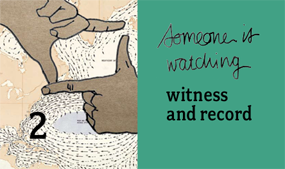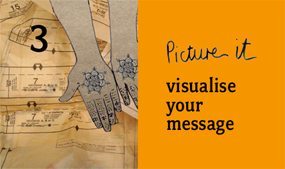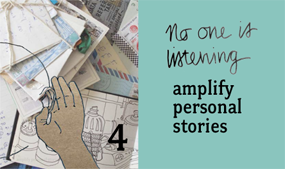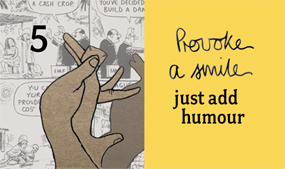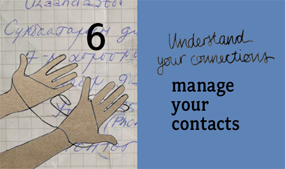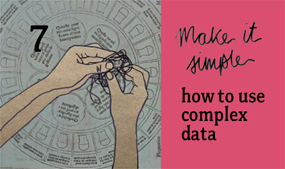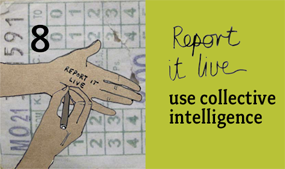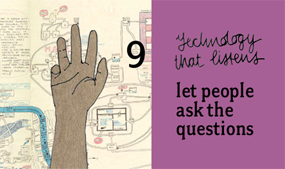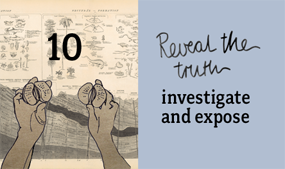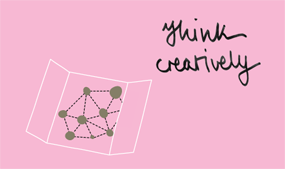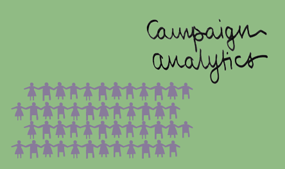This week Tactical Tech celebrates 100 worldwide screenings of 10 tactics for turning information into action. Tanya Notley, the 10 tactics project lead, reflects here on the success of this project.
In the first month 10 tactics was launched, December 2009, interest about this film swelled and it was screened at 17 different events. 2010 has been no different and apart from the screenings, the film has been translated into 20 different languages.
Eager to ensure that this growth in content is available to more people who will benefit from it, Tactical Tech will imminently launch a new 10 tactics website. This website offers viewers the film with a choice of 25 subtitles including: Belarusian, Japanese, Chinese, French, Spanish and Hindi and English. Soon Burmese, Spanish and Arabic versions of the website will also be available.
Tanya Notley (TN) discusses the success of this project with Tactical Tech intern, Gabi Sibley (GS)
(GS) When 10 tactics was created and the initial screenings were held did you think there would be over 100 screenings? Was this always the plan or did it take its own form?
(TN) Actually when we made 10 tactics we did not ever imagine that it would be used for public screening events. This was a suggestion made to us after some people had viewed the film. We put the idea to the Info-activism camp network, since they were integral to the making of the film and so many of them appeared in it. It was this network of people that really got the ball rolling by immediately organising subtitle translation into five or more languages and by organising launch events in their own countries and communities. This raised awareness about the film and led to more people wanting to see it and screen it. So actually the whole screening concept happened completely organically and it was just a matter or responding to what people wanted to do and then supporting their events by promoting them and sending out materials. As for 100 screening events, I never for a second thought this would happen! I am so glad people have been able to use the film to start new conversations, groups, projects. I think it's amazing.
(GS) What do you think that people get out of the screenings?
(TN) We know from people's feedback that they have been able to include many people in a conversation about the use of information and digital technology for social change. I've actually had the privilege of attending screenings in Sydney, Nairobi and Bristol (UK), since I happened to be in these places when a screening was taking place, so I got to see people's reactions. At one screening one of the participants was quite emotional that he had been included in this conversation and he completely got it - he could now see how he could be using technology in the work he was doing. He felt the film did not alienate him in a way so many seminars and discussions had done simply because he did not have a great deal of IT knowledge. In Nairobi the participants were all working on election monitoring and they said the film inspired them with practical ideas and it gave them something they could inspire their colleagues with. Different audiences have gotten different things out of the screenings but in the end one word keeps being repeated in the feedback: "inspiring".
(GS) Are there any screenings that stand out for you as being particularly special?
(TN) We learn about the screenings through news stories that people send in about their events. Some of these stories really sent a tingle up my spine because I felt "wow, something is happening now that did not exist before!" I got this feeling from the Mexico stories. REDDES are doing things with 10 tactics that we never could have. They have developed communities around the film and used it to help people and groups identify what they could be doing and what they need in terms of technology support. I think the screening by young climate action activists in Nepal was something special too. Inspired by the way 10 tactics was presented, they are now creating their own Climate action toolkit. The screening for young Belarusians has led to a number of new activities and that screening has really increased my own awareness about censorship and repression in that country.
(GS) What does the future hold for 10 tactics?
(TN) Besides the translations of the cards, the film, and the website which will increase our outreach to places where language has been a barrier, the film and the response to it has really changed the way we will develop all of our technology support materials at Tactical Tech. We have realised the value of placing inspiration and demystification at the front of the resources because this opens up the conversation. Everyone in a rights organisation should be able to engage in a conversation about how technology should or should not be used and by adding a film or animation layer, I think you can help happen more easily. The other thing is that it has planted a seed for a new project at Tactical Tech and I am really excited about this. Hopefully more on that later!
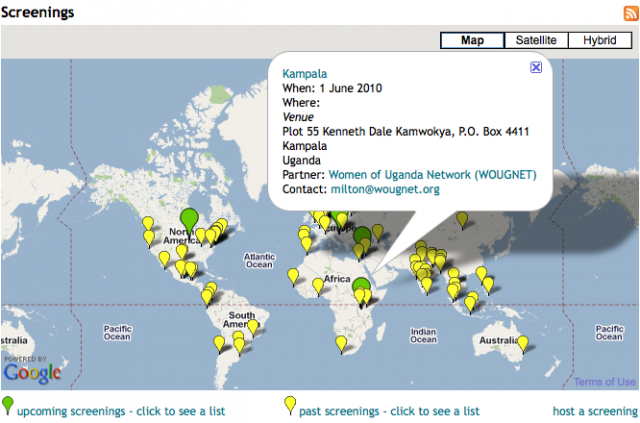
The Women of Uganda Network (WOUGNET) screened 10 tactics as part of their 10 year anniversary celebrations in Kampala. Milton Aineruhanga from WOUGNET says they chose to show this film because many of the organisations in their network are involved in advocacy and will benefit from the new strategies and inspiration 10 tactics offers.
Image: The 100th screening in Kampala highlighted on the 10 tactics map, which shows past and future screenings.



